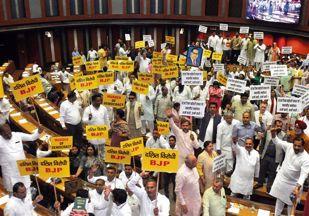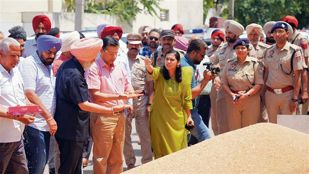Bhartesh Singh Thakur
Tribune News Service
Chandigarh, April 13
The Jallianwala Bagh massacre impacted the course of history, changed the support and cooperation for the British rule, which was witnessed during World War-I, and ignited the fire for freedom struggle, which was never extinguished, said NN Vohra, President of The Tribune Trust and former Governor of Jammu and Kashmir.
Mentioning martyrs Bhagat Singh, Rajguru, Sukhdev and Udham Singh, he said an inspirational environment was set into motion by the tragedy. “The figure of 359 or 379 being killed is not a working figure. The newspapers of those times and our own paper said over 1,000 were killed and several thousands were injured.
“I don’t have to say why The Tribune has taken the initiative to organise such a function. The reasons are manifold and serious. It is important to our present and future,” he said.
Regarding the national events which followed, he said the period saw the emergence of Mahatma Gandhi, who took control of the situation. When the demand of taking back the Rowlatt Act was declined, he called for a nationwide strike, which was successful.
He said the centenary event was an occasion to remind ourselves about the role of the media, which at that point of time were essentially newspapers. “The Tribune was out and out a nationalist paper and carried relentlessly and fearlessly the battle for freedom,” he said, adding that whatever it published, in the form of editorials and news, it built opinion, created awareness and strengthened the resolve of Indians for freedom.
He also praised the role of BG Horniman, who was the editor of The Bombay Chronicle, for supporting India’s Independence. He said during WW-I, the British administration, particularly in Punjab, was focused on recovering loans, collecting foodgrain and mobilising the largest recruitment for the army.
“Punjab was suffering from economic distress, hardships and brutalities of the regime, which all worked towards what happened at Jallianwala Bagh,” he said.
“It was a peaceful protest by local leaders and some outsiders to ask for the release of two leaders, Dr Saifuddin Kitchlew and Dr Satyapal.”
After WW-I, the Defence of India Act was succeeded by the Rowlatt Act, which was characterised by “no dalil, no vakil and no appeal” (no argument, no lawyer and no appeal), he said.
Talking about The Tribune, he said the archives of 1918, 1919 and 1920 gave an account of the paper serving and watching the interests of undivided Punjab, from the frontiers of Afghanistan to the borders of Agra, Ganganagar, Ladakh and Tibet.
“The Tribune has served as the fearless voice of the people. It continues to play the role. There is a political system. We have a democracy. There are various means to express our anger, complaints. The Tribune continues to serve the cause of the people of Punjab, Haryana, Himachal Pradesh, Jammu and Kashmir and western Uttar Pradesh.



























